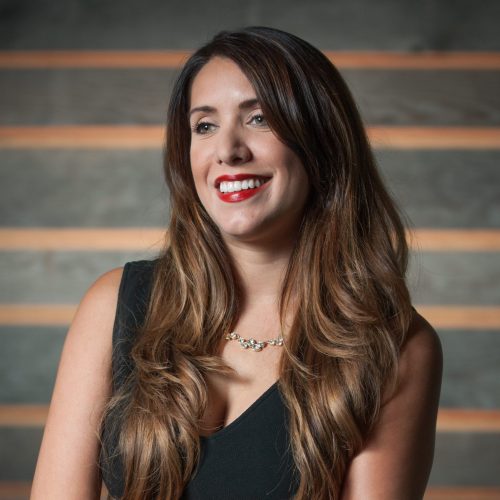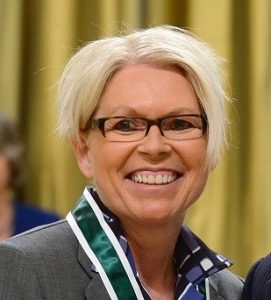
In honour of International Women’s Day, and in partnership with the BC Gender Equity Office, I’m sharing Champions for Equality, profiles of women in British Columbia whose work actively combats biases, broadens perceptions, and celebrates women’s achievements.
Denise Williams, CEO, First Nations Technology Council
On the day Denise was accepted into the Executive Master of Business Administration program at Simon Fraser University, her career path changed. The timing was great as she had just started to build the First Nations Technology Council and needed to learn leadership skills quickly and on the fly.
The opportunity to ground her thinking and a learning journey in a cohort of experienced leaders was instrumental, as was the exposure to a massive amount of material that has continued to help Denise build and scale her organization.
As an Indigenous woman in a leadership role, Denise has faced multiple challenges and biases. Although there is an increased interest in moving women – especially Indigenous women – into governance, advisory and public facing leadership roles, it’s not easy being one of the few holding space for the voices of so many others. Educating colleagues, providing emotional labour and value on subjects is no easy task, especially when the work means everything, is highly personal and you have to fight for the right to be heard.

This is a challenge Denise feels will be with her for the rest of her career. For Denise, however, the way to stand resilient is to build up a team you can trust, that’s capable of moving things forward when you need a minute to catch your breath. The saying “if you want to go fast, go alone; if you want to go far, go together” rings true, and Denise’s advice is don’t go alone!
With more Indigenous peoples’ access to digital and connected technologies in BC, Denise and the highly driven team at the First Nations Technology Council are witnessing the power of Indigenous innovation, getting a glimpse of what will happen when all people have equal access and the ability to build stronger nations.
For those who are starting out or pursuing a new goal, Denise says you are remarkable, and you will do something significant in your journey. Her advice is to turn inward, not outward, to define who you are and what you want to do. The better you are at listening to your own unique perspective and ideas, the more likely you will be able to actualize something incredible, creative and game changing in this world. Don’t try to fit in, don’t let that voice get muted, and never just do what you’re told.
For Denise, showing up and facing barriers is the most important thing, as long as you can do if safely and you have support. She acknowledges that overcoming barriers on the timeline in mind or in the way you wanted might not always happen but taking on something that feels impossible will make you a stronger leader and deepen your sense of purpose if you stay with it. She says there are no barriers that people are not capable of leaning into. She recommends share your struggle, talk about what you’re feeling, let your challenges be something the whole community can learn from.
Tracy Porteous, Executive Director, Ending Violence Association of BC
Back in the early 1980s, when Tracy was 19, she decided to volunteer at the then-new Victoria Women’s Sexual Assault Centre. Their intensive training, designed to equip volunteers to answer the crisis line and accompany survivors of sexual assault to the hospital and police, led Tracy to make a life-long commitment to helping and supporting survivors who have faced violence.
She realized later that her intense feelings about the importance of providing survivors with help was directly related to being sexually assaulted at age 14. “Sexual assault is a life-crushing experience that can destroy a person,” says Tracy of her own experience, and those she has heard and seen firsthand from many other survivors. “It was evident in the 1980s and remains so to this day that having a skilled advocate can mean the difference for their survival.”
Still in the early 1980s, building on her volunteer work, Tracy began working as a project manager at the Sexual Assault Centre and, along with two other young women, wrote a booklet aimed at teenage girls called Let’s Talk About Sexual Assault. The booklet won a national award for crime prevention and became a Canadian bestseller.
Over those years, Tracy attended every training course available to build her skills and knowledge of gender-based-violence-related trauma, counselling and support, laws, legislation and more. She also began coordinating volunteers and gaining experience in every position in the agency.

In her later role as the agency’s Executive Director, it became clear that the sexual assault centres in BC and the many community-based victim assistance programs had no voice at the provincial level. This led to the creation of the Ending Violence Association of BC or EVA BC, an organization with more than 300 programs and initiatives, and a steadfast team of dedicated staff who bring support and a collective voice for people who have faced violence and for the workers who support them.
Tracy gets her inspiration from anyone who, despite many obstacles, has found the courage to speak up about what has historically remained in silence, in a world that would rather not hear about such things. Whether it’s a survivor, a parent, a sibling of a survivor, or a politician, Tracy believes that speaking up is the antidote to violence.
Tracy says that even today, it’s not easy for people to speak about traumatic events that are deeply humiliating. Most people have never been given permission to talk about these things and others don’t know how. In fact, she points out that sexual assault continues to be largely invisible.
It was ten years ago, in response to a dramatic increase in domestic violence homicides in BC, that Tracy and her team at EVA BC decided to create a “game-changer.” They approached the BC Lions Football Club to ask that these big, burly, masculine icons become spokesmen for a campaign to prevent gender-based violence. The resulting Be More Than a Bystander campaign has been a resounding success.
Historically, people have viewed sexual assault and intimate partner violence as women’s issues, but it also needs to be seen as a men’s issue. The Be More Than a Bystander Program is premised on the fact that the vast majority of men don’t commit violence against women, but because the vast majority of violence against women is committed by men, men must be part of the conversation, become part of the solution.
Sometimes, Tracy says, it just takes deeply respecting and being still enough to allow you to hear what someone wants to tell you about a very difficult experience they have lived through, providing sacred space for them to talk and begin to heal. The individual transformation in people who have survived violence is a huge privilege to witness.
Being involved in policy change and seeing systems change like police, military, and other male-dominated industries is also what keeps Tracy going. Tracy and others at EVA BC are taking the Be More Than a Bystander work and implementing it in more male-dominated industries to change the culture at workplaces.
Tracy feels very fortunate to have come across a path of work that has led to 38 years of helping others. Although there has been little public recognition of the issue and little funding, she has had the opportunity, many times, to see healing take place in the spirit of another human being. That, she finds, completely inspiring.
Tracy encourages all young people to try and find a path of service to others that not only provides a powerful sense of satisfaction and makes a difference in a broader sense, but also contributes to the healing and transformation of individuals.
For those facing barriers who may not believe they can reach their goals, Tracy says feeling unsure or insecure is a universal experience and it’s probably more common in women. She acknowledges spending a lot of her life feeling unsure and continues to feel this way about how to reach her own goal, which is to see a government sexual assault policy put in place in B.C. and to have sexual assault centres funded.
Tracy’s advice is to be part of a group, community, sector or work force that is bigger than yourself alone. That is one of the most powerful antidotes to isolation and insecurity. She encourages anyone who wants to make social change or find their path to seek out others who share the same vision.
At this moment in Canadian history, Tracy says we are at the centre of transformation related to gender-based violence and gender equality that sits on the shoulders of 50 years of feminist activism. EVA BC is now seeing institutions, systems and (some) governments coming forward in unprecedented numbers for assistance related to training, policy and best practices.

